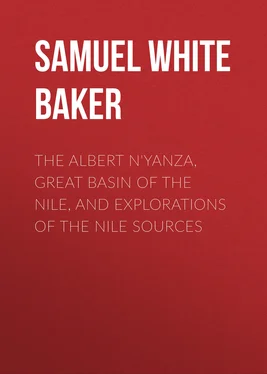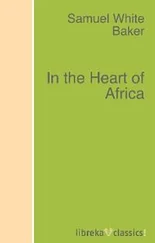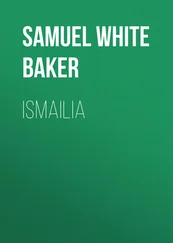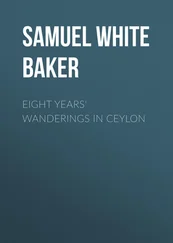Samuel White Baker - The Albert N'Yanza, Great Basin of the Nile, And Explorations of the Nile Sources
Здесь есть возможность читать онлайн «Samuel White Baker - The Albert N'Yanza, Great Basin of the Nile, And Explorations of the Nile Sources» — ознакомительный отрывок электронной книги совершенно бесплатно, а после прочтения отрывка купить полную версию. В некоторых случаях можно слушать аудио, скачать через торрент в формате fb2 и присутствует краткое содержание. Издательство: Иностранный паблик, Жанр: Путешествия и география, История, foreign_edu, foreign_antique, foreign_prose, на английском языке. Описание произведения, (предисловие) а так же отзывы посетителей доступны на портале библиотеки ЛибКат.
- Название:The Albert N'Yanza, Great Basin of the Nile, And Explorations of the Nile Sources
- Автор:
- Издательство:Иностранный паблик
- Жанр:
- Год:неизвестен
- ISBN:нет данных
- Рейтинг книги:4 / 5. Голосов: 1
-
Избранное:Добавить в избранное
- Отзывы:
-
Ваша оценка:
- 80
- 1
- 2
- 3
- 4
- 5
The Albert N'Yanza, Great Basin of the Nile, And Explorations of the Nile Sources: краткое содержание, описание и аннотация
Предлагаем к чтению аннотацию, описание, краткое содержание или предисловие (зависит от того, что написал сам автор книги «The Albert N'Yanza, Great Basin of the Nile, And Explorations of the Nile Sources»). Если вы не нашли необходимую информацию о книге — напишите в комментариях, мы постараемся отыскать её.
The Albert N'Yanza, Great Basin of the Nile, And Explorations of the Nile Sources — читать онлайн ознакомительный отрывок
Ниже представлен текст книги, разбитый по страницам. Система сохранения места последней прочитанной страницы, позволяет с удобством читать онлайн бесплатно книгу «The Albert N'Yanza, Great Basin of the Nile, And Explorations of the Nile Sources», без необходимости каждый раз заново искать на чём Вы остановились. Поставьте закладку, и сможете в любой момент перейти на страницу, на которой закончили чтение.
Интервал:
Закладка:
I accordingly amused myself at Gondokoro, exercising my horses in riding about the neighbourhood, and studying the place and people. The native dwellings are the perfection of cleanliness; the domicile of each family is surrounded by a hedge of the impenetrable euphorbia, and the interior of the enclosure generally consists of a yard neatly plastered with a cement of ashes, cow-dung, and sand. Upon this cleanly-swept surface are one or more huts surrounded by granaries of neat wicker-work, thatched, resting upon raised platforms. The huts have projecting roofs in order to afford a shade, and the entrance is usually about two feet high. When a member of the family dies he is buried in the yard; a few ox-horns and skulls are suspended on a pole above the spot, while the top of the pole is ornamented with a bunch of cock's feathers. Every man carries his weapons, pipe, and stool, the whole (except the stool) being held between his legs when standing. These natives of Gondokoro are the Bari: the men are well grown, the women are not prepossessing, but the negro-type of thick lips and flat nose is wanting; their features are good, and the woolly hair alone denotes the trace of negro blood. They are tattooed upon the stomach, sides, and back, so closely, that it has the appearance of a broad belt of fish-scales, especially when they are rubbed with red ochre, which is the prevailing fashion. This pigment is made of a peculiar clay, rich in oxide of iron, which, when burnt, is reduced to powder, and then formed into lumps like pieces of soap; both sexes anoint themselves with this ochre, formed into a paste by the admixture of grease, giving themselves the appearance of new red bricks. The only hair upon their persons is a small tuft upon the crown of the head, in which they stick one or more feathers. The women are generally free from hair, their heads being shaved. They wear a neat little lappet, about six inches long, of beads, or of small iron rings, worked like a coat of mail, in lieu of a fig-leaf, and the usual tail of fine shreds of leather or twine, spun from indigenous cotton, pendant behind. Both the lappet and tail are fastened on a belt which is worn round the loins, like those in the Shir tribe; thus the toilette is completed at once. It would be highly useful, could they only wag their tails to whisk off the flies which are torments in this country.
The cattle are very small; the goats and sheep are quite Lilliputian, but they generally give three at a birth, and thus multiply quickly. The people of the country were formerly friendly, but the Khartoumers pillage and murder them at discretion in all directions; thus, in revenge, they will shoot a poisoned arrow at a stranger unless he is powerfully escorted. The effect of the poison used for the arrow-heads is very extraordinary. A man came to me for medical aid; five months ago he bad been wounded by a poisoned arrow in the leg, below the calf, and the entire foot had been eaten away by the action of the poison. The bone rotted through just above the ankle, and the foot dropped off. The most violent poison is the produce of the root of a tree, whose milky juice yields a resin that is smeared upon the arrow. It is brought from a great distance, from some country far west of Gondokoro. The juice of the species of euphorbia, common in these countries, is also used for poisoning arrows. Boiled to the consistence of tar, it is then smeared upon the blade. The action of the poison is to corrode the flesh, which loses its fiber, and drops away like jelly, after severe inflammation and swelling. The arrows are barbed with diabolical ingenuity; some are arranged with poisoned heads that fit into sockets; these detach from the arrow on an attempt to withdraw them; thus the barbed blade, thickly smeared with poison, remains in the wound, and before it can be cut out the poison is absorbed by the system. Fortunately the natives are bad archers. The bows are invariably made of the male bamboo, and are kept perpetually strung; they are exceedingly stiff, but not very elastic, and the arrows are devoid of feathers, being simple reeds or other light wood, about three feet long, and slightly knobbed at the base as a hold for the finger and thumb; the string is never drawn with the two forefingers, as in most countries, but is simply pulled by holding the arrow between the middle joint of the forefinger and the thumb. A stiff bow drawn in this manner has very little power; accordingly the extreme range seldom exceeds a hundred and ten yards.
The Bari tribe are very hostile, and are considered to be about the worst of the White Nile. They have been so often defeated by the traders' parties in the immediate neighborhood of Gondokoro, that they are on their best behavior, while within half a mile of the station; but it is not at all uncommon to be asked for beads as a tax for the right of sitting under a shady tree, or for passing through the country. The traders' people, in order to terrify them into submission, were in the habit of binding them, hands and feet, and carrying them to the edge of a cliff about thirty feet high, a little beyond the ruins of the old mission-house: beneath this cliff the river boils in a deep eddy; into this watery grave the victims were remorselessly hurled as food for crocodiles. It appeared that this punishment was dreaded by the natives more than the bullet or rope, and it was accordingly adopted by the trading parties.
Upon my arrival at Gondokoro I was looked upon by all these parties as a spy sent by the British Government. Whenever I approached the encampments of the various traders, I heard the clanking of fetters before I reached the station, as the slaves were being quickly driven into hiding-places to avoid inspection. They were chained by two rings secured round the ankles, and connected by three or four links. One of these traders was a Copt, the father of the American Consul at Khartoum; and, to my surprise, I saw the vessels full of brigands arrive at Gondokoro, with the American flag flying at the mast-head.
Gondokoro was a perfect hell. It is utterly ignored by the Egyptian authorities, although well known to be a colony of cut-throats. Nothing would be easier than to send a few officers and two hundred men from Khartoum to form a military government, and thus impede the slave-trade; but a bribe from the traders to the authorities is sufficient to insure an uninterrupted asylum for any amount of villany. The camps were full of slaves, and the Bari natives assured me that there were large depots of slaves in the interior belonging to the traders that would be marched to Gondokoro for shipment to the Soudan a few hours after my departure. I was the great stumbling-block to the trade, and my presence at Gondokoro was considered as an unwarrantable intrusion upon a locality sacred to slavery and iniquity. There were about six hundred of the traders' people at Gondokoro, whose time was passed in drinking, quarrelling, and ill-treating the slaves. The greater number were in a constant state of intoxication, and when in such a state, it was their invariable custom to fire off their guns in the first direction prompted by their drunken instincts; thus, from morning till night, guns were popping in all quarters, and the bullets humming through the air sometimes close to our ears, and on more than one occasion they struck up the dust at my feet. Nothing was more probable than a ball through the head by ACCIDENT, which might have had the beneficial effect of ridding the traders from a spy. A boy was sitting upon the gunwale of one of the boats, when a bullet suddenly struck him in the head, shattering the skull to atoms. NO ONE HAD DONE IT. The body fell into the water, and the fragments of the skull were scattered on the deck.
After a few days' detention at Gondokoro, I saw unmistakeable signs of discontent among my men, who had evidently been tampered with by the different traders' parties. One evening several of the most disaffected came to me with a complaint that they had not enough meat, and that they must be allowed to make a razzia upon the cattle of the natives to procure some oxen. This demand being of course refused, they retired, muttering in an insolent manner their determination of stealing cattle with or without my permission. I said nothing at the time, but early on the following morning I ordered the drum to beat, and the men to fall in. I made them a short address, reminding them of the agreement made at Khartoum to follow me faithfully, and of the compact that had been entered into, that they were neither to indulge in slave-hunting nor in cattle-stealing. The only effect of my address was a great outbreak of insolence on the part of the ringleader of the previous evening. This fellow, named Eesur, was an Arab, and his impertinence was so violent, that I immediately ordered him twenty-five lashes, as an example to the others.
Читать дальшеИнтервал:
Закладка:
Похожие книги на «The Albert N'Yanza, Great Basin of the Nile, And Explorations of the Nile Sources»
Представляем Вашему вниманию похожие книги на «The Albert N'Yanza, Great Basin of the Nile, And Explorations of the Nile Sources» списком для выбора. Мы отобрали схожую по названию и смыслу литературу в надежде предоставить читателям больше вариантов отыскать новые, интересные, ещё непрочитанные произведения.
Обсуждение, отзывы о книге «The Albert N'Yanza, Great Basin of the Nile, And Explorations of the Nile Sources» и просто собственные мнения читателей. Оставьте ваши комментарии, напишите, что Вы думаете о произведении, его смысле или главных героях. Укажите что конкретно понравилось, а что нет, и почему Вы так считаете.












